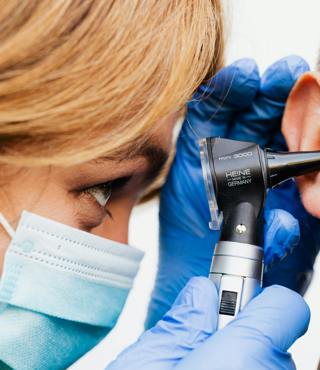
“Don’t let anyone tell you there’s nothing you can do about tinnitus”
Laura James, 30, an audiologist from Leeds, shares her journey with severe hearing loss and tinnitus. Diagnosed at 16, Laura struggled with constant tinnitus but found relief through therapy, advanced hearing aids, and coping mechanisms. She emphasises managing stress and accepting tinnitus as key to improving life quality.
Laura James, 30, an audiologist from Leeds, has severe hearing loss and constant tinnitus. But years of therapy and practice has taught her the best ways to manage the condition.
“LOOKING back, I always had tinnitus but I wasn’t aware as a child that it was anything but normal. I thought everybody must have it. Between the ages of 0-16, I had an undiagnosed hearing loss, although we didn’t know that then. My mum was told by various doctors throughout that time that she was being overprotective and that I was just being an normal ‘ignorant’ child and ignoring what I wanted to ignore.
When I was 16, we got an ‘oh sorry’ from my GP, when I was finally diagnosed with a severe hearing loss in both ears and was fitted with hearing aids. It was at this time that I became aware of what tinnitus was. In some ways, I think I preferred the ignorance of not knowing because from then on, it seemed to be so much more prominent. It was always constant but now my brain didn’t let me ignore it like it did before.
Over the years I struggled with the severity of my tinnitus. It was always there in some form but I would have spikes where it would become unbearable and I struggled to cope with it. I tried to learn coping mechanisms but I didn’t really know how or where to start.
As each year progressed, I learnt to ignore the tinnitus the best I could but it was always there, always banging away in some form. I told myself how wonderful it would be just to get rid of the tinnitus, but keep the deafness! How lovely silence must be. In 2010 I got my first set of private hearing aids which transformed by life. I then decided to become an audiologist and in 2012 I did just that! At this point I learnt a lot more about what tinnitus was, what could be done to help, and what could cause spikes. I experimented with hearing aid technology, using tinnitus programmes, tinnitus apps on my phone and relaxation techniques. I gradually learnt that if I had a spike, it would get better if I just stopped getting stressed about it. As all that did was feed into the cycle. It was hard but I gradually convinced myself that I just needed to ride the spikes out.
If anything my tinnitus has worsened over the last 4 years. I’ve had the worst spikes I’ve ever had, sometimes having 3 or 4 sounds over each other but I know that it is linked to my stress levels, anxiety levels and my health. I find if I mange those things, my tinnitus does improve or rather my ability to cope with the tinnitus improves. I rely heavily on my hearing aids and their ability to have tinnitus programmes and stream tinnitus maskers from apps on my phone. Just wearing the aids themselves takes the edge of the tinnitus as without them, I cannot hear anything apart from the tinnitus.
The best thing I ever did was learn to accept the fact I have tinnitus and that it may never go away. Doing this changed my perception of it. Rather than wishing it away or thinking why me and feeling sorry for myself, I just carry on with using the strategies I have learnt to take my mind of it. You can absolutely train your brain to ignore it or rather just feel better about it being there. Yes, there may be no cure for tinnitus (yet) but don’t let anyone tell you that there is nothing that can be done to improve your life when you live with tinnitus. There absolutely is. You aren’t alone.”
*Article originally published by RNID - "Don't let anyone tell you there's nothing you can do about tinnitus" - RNID *
